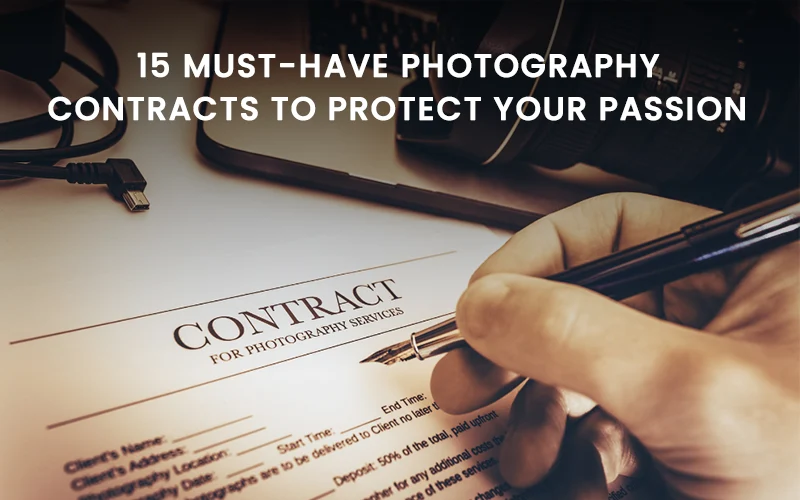As a professional photographer, you know how important it is to have photography contracts.
A photography contract is a legal document that outlines the terms and conditions of your services, protects your rights and interests, and prevents misunderstandings and disputes.
But what should you include in your photography contract? How can you make sure that your contract covers all the essential aspects of your photography business? And how can you write a contract that is clear, concise, and easy to understand?
In this blog post, we will share with you the crucial elements that you should include in every photography contract. These elements will help you create a photography contract that is comprehensive, professional, and effective.
Table of contents
What Are Photography Contracts?

A photography contract is a written agreement between a photographer and a client who wants to hire the photographer for a specific job.
The contract explains what the photographer will do, how much the client will pay, and when the photos will be delivered. It also protects both parties from any problems or misunderstandings that might happen during or after the work.
The contract should include the names and contact information of both parties, the details of the service, the responsibilities of each party, the payment terms, the cancellation policy, the photo rights, and the signatures of both parties.
A photography contract is important because it helps to make sure that the photographer and the client are happy with the outcome of the work.
Check out: Photography Business Cards Bundle
Types Of Photography Contracts
1. Wedding Photography Contract
A wedding photography contract is a promise paper between the couple and the photographer. It says when, where, and how much for the wedding photos. Also, it helps avoid problems and keeps things clear for everyone. It can be further categorized into destination wedding photography contract, etc.
Check out: Capturing Love: How to Start and Succeed in the Wedding Photography Business
2. Event Photography Contract
An event photography contract is like a deal between the person hosting an event and the photographer. It says what pictures will be taken, when, and for how much money. It’s a simple way to make sure everyone knows what to expect and avoids any misunderstandings.
3. Portrait Photography Contract
A portrait photography contract is a document that a photographer and a client sign before a photo shoot. It describes what kind of photos the photographer will take, when and where the photo shoot will happen, how much the client will pay, and how the photos can be used by both parties.
Looking for portrait photography contract template? Check out this collection of contract and form templates.
4. Commercial Photography Contract
A commercial photography contract is a deal between a business and a photographer. It spells out the details, like where and when the photoshoot will happen, how much it will cost, and what the photos will be used for. It’s like a business agreement to make sure both sides are on the same page.
5. Real Estate Photography Contract
A real estate photography contract is like a promise between a photographer and a property owner. It says what photos will be taken, when, and how they can be used. It helps avoid misunderstandings and ensures both parties are on the same page.
6. Boudoir Photography Contract
A boudoir contract is an agreement between you and the photographer for intimate and personal photos. It covers things like where and when the photoshoot will happen, the cost, and what’s included.
Check out: Modern Boudoir Contract Template
7. New Born Photography Contract
A newborn photography contract is a simple agreement between parents and the photographer for baby pictures. It helps ensure a smooth and comfortable session for the little one and the parents.
Check out: Boost Family Portrait Business By Leveraging Church Directories
8. Product Photography Contract
A product photography contract is like a deal between the business and the photographer for pictures of their products. It says when, where, and how much for the photos. It’s a clear agreement to make sure everyone knows what’s expected and gets the images they need for the products.
Why You Need A Photography Contract?

The big reason why a photographer contract sample is so important for your photography business is to keep you safe. With a contract, you can clearly say what you’ll do, when you’ll do it, and who’s responsible for what. If someone doesn’t follow the rules, the contract says what happens next. This way, everyone knows what to expect, and it helps avoid problems.
Contracts for your photography business also make you look like a real pro and build trust with your clients. If something goes wrong, both of you have made promises to keep things fair.
And guess what? Contracts are like a detailed list of what the client is paying for—your prices and any extra costs. This way, there are no surprises or confusion when it’s time to pay the bill.
What Should A Photography Contract Include?
1. Contact Information

The first element of your photography contract is the contact information of both parties. This includes the name, address, email, phone number, and website of the photographer and the client.
This information is necessary to identify the parties, communicate effectively, and send invoices and payments.
2. Description Of Services
The second element of your photography contract is the description of services. This is where you specify what kind of photography services you are providing, such as portrait, wedding, event, commercial, or real estate photography.
You should also include details such as the date, time, location, duration, and style of the shoot, the number of photos, the format and delivery method of the photos, and any additional services or products, such as prints, albums, or editing.
Check out: Lesser-Known Ways To Market Your Photography Business
3. Permits

If your ultimate photo session is in a special place, you might need permission, called permits. Usually, photographers ask clients to get these permits. It means they need to apply for them on time and pay the fees that are needed.
4. Image Rights
This is where you define who owns the copyright to the photos, who can use them, and for what purposes.
You should also specify if you have the right to use the photos for your own portfolio, marketing, or other purposes, and if you need the client’s permission or credit.
5. Usage Rights

Once you’ve made it clear that you own the rights to your photos, it’s time to talk about how they can be used. This part depends on who you’re taking pictures for.
For regular folks like those getting portrait or wedding photos, you might say they can’t use the pictures for business stuff. But if it’s a successful photography business hiring you, you’ll need to explain exactly what they can and can’t do with the photos.
6. Cancellation Policy
This is where you tell your clients how they can cancel the deal and what happens if they do. Also, mention what you need to do if they cancel.
For instance, do they get some money back if they already paid? Or is it a non-refundable fee? Can they use it for a future photo session if they cancel? Think about different situations to make sure everything is clear and fair.
Check out: Photography Business Essentials: The Promotional Flyer
7. Payment Terms

This is where you state how much you are charging for your services, how and when you expect to be paid, and what payment methods you accept. You should also include information about deposits, retainers, late fees, cancellations, refunds, and taxes.
8. Indemnification
This is where you ask the client to protect you from any problems, fights, or losses that may happen because of the photos or the contract. This means that the client will pay for your lawyer and costs if someone else sues you.
Check out: The Essential Guide To Photography Copyright Laws
9. Confidentiality
Confidentiality means that you agree to keep the client’s personal and business information confidential and not disclose it to anyone without their permission.
This is especially important if you are photographing sensitive or confidential subjects, such as trade secrets, intellectual property, or personal data.
10. Model Releases

This is where you obtain the consent of the people who appear in the photos to use their likeness for commercial or artistic purposes. A model release is especially important if you are photographing celebrities, minors, or sensitive subjects, such as nudity or violence.
11. Liability Limitations
Here, you make it clear that you’re not responsible for any accidents, injuries, or losses during or after the photo session.
You should also say that you’re not in charge if something unexpected, like a natural disaster, happens and stops you from doing your job.
12. Fees
Make sure your contract shows how much your services cost. It’s smart to explain the fees in detail and say who pays for any extra expenses. This way, your client won’t be surprised when they get the bill.
Check out: How to Create a Free Photography Website
13. Appendices
Here, you can include extra papers or information that goes along with the contract, like schedules, bills, receipts, or examples of your work.
14. Post-Production & Photo Editing

This part of the contract is where you say what kind of edits you’ll make to the photos and what changes your client can make.
Since your work is like your brand, it’s a good idea to have some limits on how much your clients can easily edit your pictures.
15. FAQ
This is where you answer some of the most common questions that your clients may have about your services, such as what to wear, how to prepare, what to expect, and how to contact you.
Conclusion – Photography Contracts
You’ve just learned about the essential elements that photography contracts should have.
These elements will help you protect your rights, set clear expectations, and avoid any disputes or misunderstandings with your clients.
Remember, a good contract is a legal document and a reflection of your brand and your value as a photographer.
So, make sure your contract is clear, concise, and compelling. And remember to have fun with your photography!
Do you want to Submit a Guest Post for PhotoWhoa? The PhotoWhoa blog accepts and welcomes guest contributions. Submit your information to our editorial team, and we will get back to you!
Like this post? Check out more of such amazing content on our blog.











